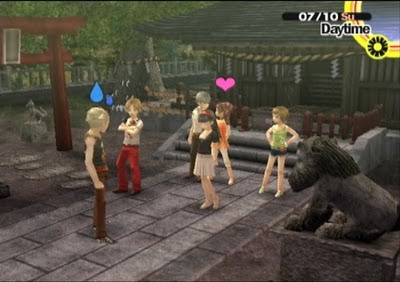Both Persona 3 and 4 are excellent games. Unlike a lot of reviewers, I don't like to spend most of my time talking about all the minor improvements that each new iteration of a series makes. Suffice it to say that if you only have time to play one of these games, and they are long games, play Persona 4. They have entirely separate stories with different settings (and a single event that connects them, as a fan service), and according to one man's opinion, the improvements are worth something.For this reason, I'm going to spend most of my time talking about Persona 4, although there are interesting and important differences in setting and plot between the two games that I hope to talk about.
To save time, I'm also going to assume some familiarity with the basic mechanics and premise of the game. Reading through this spoiler-free description at HG101 is worth your time if you haven't played either of these games before; there are really no other games I'm aware of in the states that I can effectively compare these to.
With that out of the way, I'm going to list three aspects of Persona 4 that make it a special game for me. Then my plan is to spend one post elaborating further on each of these aspects, with maybe a conclusion post at the end. Here goes:
1. It's Japan, stupid!
Growing up as a fan of video games, I've learned that good localizations really do make all the difference. And though translations have gotten a lot better in the last five or ten years, way too many publishers try to pull the rug over our eyes about where a game originated, by replacing all references to Japanese culture with obvious American substitutions.
One of the few upsides of the diminishing market for Japanese games in the states is that those games that do make it over here are less afraid to show themselves for what they are to a more dedicated audience. Atlus is smart enough to figure out that Persona 3 and 4's rich grounding in Japanese culture was much more of an asset than a liability.
It doesn't do it justice to say simply that Persona 4 is set in Japan. Yes, you will learn many surprising facts about Japanese holidays, the rigid school system (6 days a week, with frequent testing), delicious-sounding food (P3 set Clare and I on a search for good ramen in Portland), and the complex meanings of the different Japanese signifiers (which are completely untranslatable).

What makes P4 so unique and fascinating is that it is not a game about Japan, it is a game about Japanese people, who live in this culture and deal with these conventions. Your character experiences the pressure to get good grades in a school that posts the test scores of each student publicly. He risks embarrassment to show affection and perhaps have a relationship in front of disapproving adults. In its own implicit way, the game also confronts expected gender roles and homosexuality. All of these issues get reflected in the "other" world, in the bizarre nature of the enemies you fight (the game is similar to Earthbound in this respect). This leads into my second point:
2. Escaping the Representation-ist Philosophy
As we all know, RPGs started on the table top, as a way for adolescents to become heroes in a fantasy setting. The mechanics, dice-rolling and all, were simply a means to simulate the chance elements that factor into a real-life (or fantastical) battle.
 These days it's popular to call JRPGs derivative and uninnovative, but historically they have made one important development in the RPG form that Western developers have been slow to pick up on. They liberated the RPG mechanic from it's representation-ist origins. The kind of battles that take place in P4 make no sense realistically; you're looking at a bunch of kids carrying fans and baseball bats surrounding something called a "Fickle Papillons" (bunch of butterlies) and a "Chaos Fuzz" (crazy cop-gorilla hybrid). The battles that these simulate (in their own way) take place in the real world, with real-life enemies like depression and anxiety.
These days it's popular to call JRPGs derivative and uninnovative, but historically they have made one important development in the RPG form that Western developers have been slow to pick up on. They liberated the RPG mechanic from it's representation-ist origins. The kind of battles that take place in P4 make no sense realistically; you're looking at a bunch of kids carrying fans and baseball bats surrounding something called a "Fickle Papillons" (bunch of butterlies) and a "Chaos Fuzz" (crazy cop-gorilla hybrid). The battles that these simulate (in their own way) take place in the real world, with real-life enemies like depression and anxiety.Plenty of JRPGs before P4 use interesting symbolism in the enemy design, but P4 is uniquely explicit in this regard (this is one way in which P4 excels P3 as well). The Personas that emerge from each character (as evil Shadows to be confronted) create their own worlds that reflect their own personal conflicts. The main insight that allowed the Persona series to be born from the giant Shin Megami Tensei juggernaut is that the demons that the characters control in those games are a lot like the inner kind that any high school student deals with.
3. A Sense of Time
One of my favorite aspects of Mother 3 is that for a very long time, the game is centered around different characters in a single community. Unlike so many RPGs, Mother 3 gave you a firm sense of home, something worth protecting (which also makes the surprise ending a lot more interesting).
P4 gives you more than a home, it gives you a normal life. No matter how serious the situation gets (and like many RPGs, the world is in peril), you will always be just a normal student to those around you. And God help you if you ever skip school.

Instead of progressing through places, P4 progresses through time, and the game is driven by a kind of rigid schedule. Some people complain about the level of grind in P3 and P4 (something that's offset by playing with a partner), but sticking in one place has some definite upsides. Characters can have roles more complex than a class type and a backstory; you're friends can have families, they can feel trapped in their jobs (many of which are inherited). Characters can be allowed to develop on their own instead of letting a constant change of venue drive them along.
Anyways, I hope to go into more detail soon. Till next time.
Screenshots from HG101, and 1up.

No comments:
Post a Comment